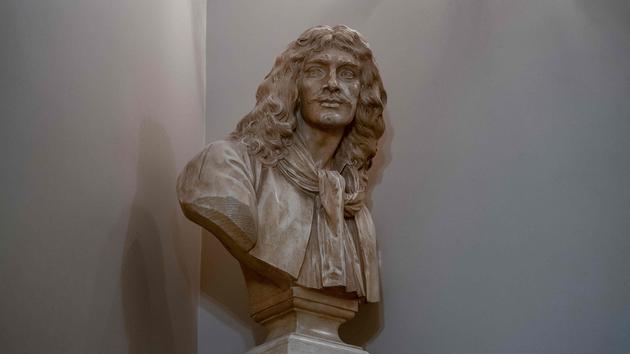May 12, 1664. Le Tartuffe ou l'Hypocrite, a comedy in three acts, is conceived and performed at the Palace of Versailles before Louis XIV.
But on the insistence of the Archbishop of Paris, Hardouin de Péréfixe, the Sun King was forced to forbid any distribution.
358 years later, the complete text of this play - which provoked a state affair under the absolute monarchy by divine right - can be reborn on the stage of the Comédie-Française, thanks to the reconstruction efforts carried out by Georges Forestier, professor emeritus at the Sorbonne.
"To restore the dialogues, it was necessary to carry out a real work of genetic research from the version in five acts, as well as period documents", assures Emilia Aru, founder and director of the Portaparole editions, at the origin of this unpublished publication of the very first version of Tartuffe by Molière, a work which provides us with the opportunity to recall to what extent the playwright knew how to use the springs of the alexandrine, a form of classical verse par excellence.
Tartuffe is a trickster who hypocritically poses as a pious man in order to pursue his personal interests.
He notably covets Elmire, the wife of Orgon.
It is by the chiseling of the alexandrines that the false devotee skillfully reveals his desire, seeking to disguise it with the habit of a monk:
“The love that binds us to eternal beauties,
Do not stifle in us the love of temporals.
Our senses can easily be charmed
Perfect works that heaven has formed.
(…)” (Tartuffe or the Hypocrite, act II, scene three)
The construction of the passage above shows an impeccable symmetry: if we consider the silent e, the qualifying adjectives "eternal" and "temporal" have three syllables respectively and are both located in the ninth metric position. Moreover, they form a rich rhyme followed which makes it possible to create an oxymoron revealing of the double language which holds the impostor. The two following alexandrines confirm this alternation between the vocabulary of sensuality (“meanings”, “charmed”) and that of piety (“perfect works”, “heaven”). The replies of the eponymous character lift the veil on the power of manipulation by language when the words turn out to be chosen, even arranged, with meticulous accuracy and precision.
In this perspective of deception, let's also read this short extract which shows us a Tartuffe unmasked by Damis, the son of Orgon, overplaying the autoflagellation to save his role:
“Yes, my brother, I am a villain, a culprit,
An unfortunate sinner, full of iniquity,
(…)” (Tartuffe or the Hypocrite, act II, scene six)
Tartuffe lists the words of the prosecution in an attempt to play on Orgon's sensitive chord, in order to keep his favors. The verbal accumulation in these two alexandrines reinforces the dramatic irony in the eyes of the spectators, more than ever aware - unlike Orgon - of the character's falsity. It is worth considering first the first meter which ingeniously establishes a rhythm of diction in three beats: by virtue of this cadence, the Manichaean word "wicked" is placed in the central part of the verse, and framed by two commas which make it possible to pause to affirm (by means of the adverb “yes”) the guilt-inducing terms of fault (“wicked” and “guilty”). The following alexandrine plays on a caesura in the hemistich to highlight the common noun “sinner”, thanks to the syntactic pause provided by the comma.
This piece thus gives full meaning to the paradox of the French alexandrine, which manages to condense complex thought into a very restricted space.
There is no doubt that Molière would be delighted to attend today, at the Comédie-Française, the first public performance of his original Tartuffe.
Molière, Le Tartuffe ou l'Hypocrite, comedy in three acts reproduced by Georges Forestier, Portaparole editions (120 pages, €16).

